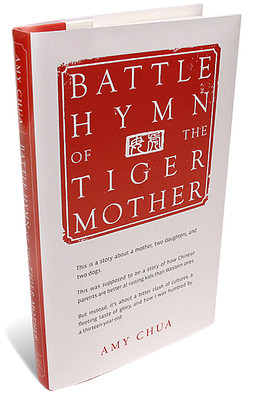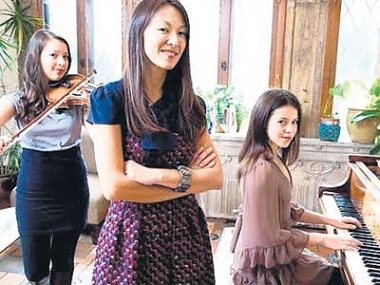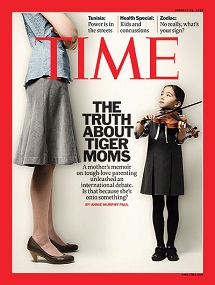
I think I suffer from tiger mom
syndrome, y'all.
You see, I just totally smashed Battle Hymn of a Tiger Mother. My
read-ezvous sparked after watching a February 2011 Tavis Smiley
interview with author and Yale professor Amy Chua who wrote this polarizing memoir on Eastern, particularly Asian,
parenting tactics.
Chua chronicles how she is the product of crazy-strict Chinese immigrant parents. Subsequently, she became a tough parent. Her daughters underwent rigorous musical and academic schedules. Interestingly enough, Battle Hymn was written after Chua's youngest daughter, Lulu, uproariously chafed against this military-style upbringing. Chua (and her Jewish husband, Jed) eventually learned to compromise.
The content wasn't all glorious; parts
of Battle Hymn made me cringe. Early
on in the book, Chua recalled how she threatened to burn all of Lulu's dolls if
she didn't practice the violin. Later, she recounted how the mandatory 3-hours-per-day
instrument practice policy was not lifted even during expensive family
vacations (she booked hotels based on whether she could rent the ballroom
pianos).
Still, she chuckled at her own ridiculousness. Battle Hymns' self-effacing and tongue-in-cheek messages were not lost on the reader. Chua gracefully danced between inner turmoil and pleasant nostalgia. Her book was woven like its namesake: a dramatic hymnal.
Chua doesn't claim to know all of the answers. Her memoir, she contends, is not
to be mistaken as a parenting guide. At the same time, Chua stands by her
convictions that even though Lulu rebelled, their iron-fisted family life
reaped rewards: both of her daughters now attend Ivy Leagues. One played at
Carnegie Hall at just 13. The other led a prestigious New England Youth
Orchestra and nearly made it into Julliard. These milestones were not without
family strife, though. Chua points to this crazy dynamic as her reason for
penning Battle Hymn.
Journalists, bloggers and psychologists have all weighed in. By her own admission, Chua receives conflicting feedback. She's labeled an abusive monster by many Americans. Conversely, she receives plenty of letters from, say, Nigerians or Jamaicans who jokingly exclaim, "Goodness, are you sure MY mom didn't write this book?!"
Like Chua, I'm a product of immigrant parents. My upbringing was
different...but I'm not sure I would call it strict or oppressive. More than
anything my upbringing was comical, as I reflect on it. There was just a
certain standard, a way of doing things that is very characteristic of many
Black Nicaraguan families. I guess a part of it had to do with a "kids
should be seen and not heard" mentality. There was a kid's place and I
just knew to stay in it or else. I was mischievous, for sure, but never wicked
and lawless.

I believe, as Chua does, that many immigrant parents are often no-nonsense
disciplinarians. A girlfriend of mine keeps me in stitches when she mocks her
Haitian tiger mom. At the same time, I also know plenty of American,
particularly African-American, tiger moms who "don't play that," if
you will. I'm thinking of my buddy, LJ. His stern and, yes, then-single
American mom is the reason he turned out to be an extraordinary man. In fact, LJ's
mom reminds me of the famous, self-proclaimed Black Lioness Mom (indeed, a
response to Battle Hymn) Dr. Yvonne
Thornton, the genius behind The Ditch
Digger's Daughters, which inspired the Oprah film by the same title. That's
a whole 'nother column, I'm afraid, but you can read more
here.
Regardless of nationality, tiger moms and dads are hungry, which seeps through their modes of parenting. They often
journey from afar. So, they seek to go far, I suppose. It all comes from love...tough,
tough love. The key, as Chua ultimately pens, is to pull back and listen to
their children, lest tiger parents lose them. What's needed is a hybrid between
old-world and new-world lifestyles.
I get Chua and other tiger parents like her. Battle Hymn burned in my memory yesterday when I picked up my daughter from school for a doctor's appointment. I watched, empathetically, as an apparently Caribbean mom spanked her teen son in the school's Main Office. I admit that I knew all-too-well from where her passion, so rich that neither the assistant principal nor security could calm her, spurred. And, again, I thought of Battle Hymn later in the evening, when I stumbled across a new show, America's Supernanny, which features a no-nonsense parenting guru. She happens to be a minority tiger parent.
So, friends, here's my ode to tiger parents:
You know you are the product of a tiger parent if the only sleep-overs you ever attended were church shut-in's.
You know that you're the product of a tiger parent if "play-dates" meant excursions at libraries or museums that were nestled in between rote multiplication table memorization. With cousins. Not friends.
You know you're the product of a tiger parent if Hop Scotch, Scrabble, Chess and Sudoku is as close as you get to a PlayStation or DS.

You know you're the product of a tiger parent if a C means an F; a B means a C and an A means you're safe from utter wrath.
You know you're the product of a tiger parent if graduate or professional school simply wasn't an option. It was a MUST.
You know you're the product of a tiger parent if you received a U.S. News and World Report Guide to College Rankings as a Christmas stocking stuffer.
You know you're the product of a tiger parent if "hobbies" or "extracurriculars" entailed wind or string instruments and spelling bees.
You know you're the product of a tiger parent if you could recite by heart the scriptures "As for me and my house, we will serve the Lord," "Honor thy Father and Mother, so your days may be long," and "Spare the rod, spoil the child"...by 3 years old...at the very latest.
 Ana Valeska is a
not-so-naughty librarian, college instructor, book editor and--yeah,baby--NEWD
columnist. Her forthcoming work, Tu Eres (You Are), is a devotional
based on modern-day worship psalms. Ana Valeska longs to help
redeem urban, young adult culture for the Lord Jesus. Her
daughter, Selena, and cat, Puffles, have her wrapped around their little
fingers.
Ana Valeska is a
not-so-naughty librarian, college instructor, book editor and--yeah,baby--NEWD
columnist. Her forthcoming work, Tu Eres (You Are), is a devotional
based on modern-day worship psalms. Ana Valeska longs to help
redeem urban, young adult culture for the Lord Jesus. Her
daughter, Selena, and cat, Puffles, have her wrapped around their little
fingers.

